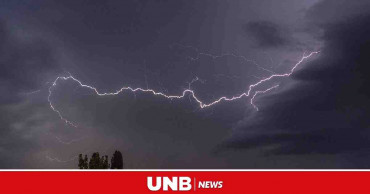Tree plantation
25% of total land area by 2030: Bangladesh sets ambitious tree cover expansion goal
The Bangladesh government has set ambitious goals to expand the country’s tree cover from 22.37% to 25% of total land area by 2030. Forest coverage is also targeted to increase from 14.1% to 16%. Environment, Forest, and Climate Change Minister Saber Hossain Chowdhury shared these objectives with UNB.
“The government has adopted the National Action Program for Combating Desertification, Land Degradation, and Drought for 2015-2024,” the minister told UNB.
8.33 crore trees to be planted this year during monsoon: Environment secretary
In alignment with the UN’s Sustainable Development Goal 15 and the decisions of the UN Convention to Combat Desertification (UNCCD) COP-13, Bangladesh aims to achieve 'Land Degradation Neutrality' by 2030. A national roadmap for addressing land degradation from 2021 to 2041 has also been developed.
1 year ago
Plant trees to shield Bangladesh from climate change: PM Hasina
Prime Minister Sheikh Hasina on Monday (June 5, 2023) urged the people to plant trees in a bid to protect Bangladesh from the adverse impacts of climate change.
“I would like to urge all to save the environment because it is our duty to offset the impacts of climate change in Bangladesh,” she said after three saplings on the Ganabhaban premises to mark the World Environment Day 2023.
She also inaugurated the Environment Fair-2023, National Tree Plantation Campaign and Tree Fair-2023 on the occasion.
Read: Thinking of lasting solutions to climate impacts: Finance Minister
“Since today is World Environment Day, I planted trees. I hope all (the people) of Bangladesh follow it (to plant trees),” she said.
The PM said they have been implementing the tree plantation programme on a massive scale so that Bangladesh would be more beautiful and developed.
2 years ago
16-days of activism: Zonta Club of Greater Dhaka conducts tree plantation, rickshaw rally in the city
As part of its ongoing ‘16 Days of Activism’ campaign against gender-based violence, Zonta Club of Greater Dhaka conducted a handful of activities on Monday in the capital's Baridhara.
The activities included tree plantation in the Baridhara Lake Park, which was followed by a special rickshaw rally.
Zonta Club of Greater Dhaka executives and members joined the activities alongside the local rickshaw pullers wearing orange dresses, as a unity against violence against women and children.
Read more: Zonta Club of Greater Dhaka launches 16-days activism campaign against gender-based violence
3 years ago
LankaBangla tree plantation programme held at Sheikh Hasina Software Park
LankaBangla Foundation organised a tree plantation programme at Sheikh Hasina Software Technology Park in Jashore Thursday.
With the theme "Let's plant trees to build Bangabandhu's dream country," Khwaja Shahriar, managing director of LankaBangla Finance, and Major Mohammad Moslem Uddin Sikder, general manager of Techcity Bangladesh, inaugurated the programme by planting saplings.
As part of this programme, about 2,000 saplings of fruit and wood trees will be planted at Sheikh Hasina Park.
Read: LankaBangla introduces unique deposit schemes
To increase the country's forest resources and maintain its ecological balance, along with encouraging everyone to plant trees voluntarily, LankaBangla Foundation organised this tree plantation programme.
Taking land erosion problem, fruit production, long-term conservation of environment and biodiversity into account, LankaBangla Foundation has been carrying out various tree plantation programmes around the country as part of its corporate social responsibility (CSR) activities, according to a media statement.
4 years ago
Lightning strike turning into deadliest disaster in Bangladesh: Experts
Lightning strike has turned into one of the deadliest natural disasters in Bangladesh claiming over 200 lives every year due to the loss of natural defense and lack of precautionary measures, say experts.
They blame deforestation, worsening air pollution and global warming, climate variability, and the growing use of mobile and other technological devices for the increase in the frequency of lightning strikes.
According to the Ministry of Disaster Management and Relief, 2,164 people died in lightning strikes in the country from 2011 to 2020. At least 216 people die every year on average in lightning strikes, more than by floods, cyclones and other natural calamities.
Read: Thunderstorm Lightning Struck Safety Tips: Stay Prepared
The experts said about 70 percent of the total lightning strikes usually occur between April and June, and advise everyone to move with caution during this time.
Farmers the worst victims
Contacted, Md Rashim Molla, Secretary-General of Save the Society and Thunderstorm Awareness Forum said, at least 177 people, including 122 farmers, were killed and 47 others injured, by lightning strikes across the country in between March 31 and June 7 this year as per their recent study.
The casualties were higher in Sunamganj, Netrokona, Kishoreganj and Gaibandha districts over the last one and a half months. “Most of those killed by lightning strikes were working in open fields or fishing. About 90% of the victims were men.”
He said lightning has now turned into the deadliest natural disaster in the country. “The death toll from lightning strikes is much higher than that of cyclones and tidal surges, landslides and floods.”
Rashim said people in rural areas, croplands or playground and open spaces are mainly falling victims to lightning strikes for lack of protection.
Causes behind
Prof Ainun Nishat, a noted climate change researcher, said it seems the frequency of lightning strikes has increased in Bangladesh due to the rise in temperature caused by climate change. “But data relating to lightning strikes are not collected scientifically in our country. We should take steps for collecting solid data and carry out scientific studies in this regard.”
He said the overall temperature in the world is growing gradually and so far around one degree has already increased. “The growing temperature due to climate change is causing more water evaporation from the land and ocean. It’s increasing black clouds with potential lightning storms.”
Read: 3 killed by lightning strike in Magura, Madaripur, Khulna
Rashim Molla said climate change, decrease in tall trees, increase in rain clouds, random set-up of mobile towers and increase in temperature across the globe can be the main factors behind the unusual rise in thunderstorms.
Besides, Rashim said, a one-degree rise in temperature can cause the chances of thunderstorms to rise by 10 percent.
Gawher Nayeem Wahra, Member Secretary of Disaster Forum, said the main reason behind the increase in lightning strikes is the lack of trees. “Thunderbolts attack the tallest humans in a field or open space without trees.”
“People's knowledge on earthing is low. Old houses that had earthing are gone now along with trees,” he observed.
Gawher said many people die on the spot after being hit by lightning strikes while many injured slowly die as there is no treatment for lightning burns.
What’s the solution?
Ainun Nishat said the hotspots for the lightning strikes should be identified properly through scientific studies and effective steps need to be taken to protect people there. “People should be made aware that they shouldn’t be there in the open field when back clouds gather in the sky.”
He said the government has taken a step for planting palm trees to lessen the casualties, but it takes around 20 years to raise such a tree.
Read: Plant more trees for greener future: Hasina
Besides, the expert said, the Disaster Management Bureau has taken a step to install poles or lightning arresters in the fields across the country. “It’s a good initiative.”
4 years ago
PM calls for unity in war against nature
Prime Minister Sheikh Hasina called upon all to remain united in the war against nature to avert a possible loss for mankind.
“In our war against nature, we’ll lose unless we unite,” she wrote in the renowned magazine Diplomat in its April 2021 issue.
In the write up – ‘Forging Dhaka-Glasgow CVF-COP26 Solidarity’ – she said that humans are consciously destroying the very support systems that are keeping us alive.
“What planet shall we leave for the Greta Thunbergs or those at the Bangladesh Coastal Youth Action Hubs? At COP26 we must not fail them,” she said.
Sheikh Hasina, currently the president of the Climate Vulnerable Forum (CVF), said, we want to see climate financing unleashed, not only towards low-carbon economy, but also for the promised US$100 billion, and 50 percent dedicated to climate resilience-building.
Also read: Leaders Summit on Climate: Kerry due Apr 9 to invite PM Hasina
“We want to see international carbon markets unlocked for transnational climate cooperation and solutions found to our profound loss, damage and climate injustice,” she added.
She mentioned that the CVF represents over one billion of the world’s most vulnerable communities, whose very survival is threatened by the slightest sea level rise, frequent hurricanes or rapid desertification.
In this connection, she said that for Bangladesh, often referred to as the ‘ground zero’ of natural disasters, climate change is a survival battle braved by millions of our resilient people whose homes, lands and crops are lost to the recurring wrath of nature.
Every year, 2% of country’s GDP is lost to extreme climate events. By the turn of the century, it will be 9%. By 2050, more than 17% of its coastlines will go underwater displacing 30 million.
Six million Bangladeshis have already become climate displaced. And yet the country continues to bear the 1.1 million Rohingyas from Myanmar at the cost of environmental havoc in Cox’s Bazar.
“Who will pay for this loss and damage?” She asked.
Also read: Climate adaptation: Bangladesh for making finance more accessible
The Prime Minister wrote that like Bangladesh, every CVF nation has an irreversible climate loss and damage story to tell.
“But they contributed little to global emissions. It is time to address this climate injustice.”
She said that international cooperation on climate had been de-prioritised by the US for several years. International climate finance was falling far short of the $100 billion pledged at Paris.
“The G-20, accounting for nearly 80 per cent of global emissions lacked the political will to finance transactional carbon markets to support low-carbon projects in vulnerable countries. Loss and damage remained a far cry.”
And then, she said, COVID-19 hit us like a bolt from the blue, triggering the triple perils of climate, health and nature. A rude awakening finally forced the world to heed to my warning that the climate crisis is indeed an emergency.
And any recovery had to be green, nature-based and resilient. Therefore, my first act as CVF President was to declare climate change a ‘planetary emergency’ and call upon all to be on a ‘war footing’ to arrest global temperature rise at 1.5 degrees.
Also read: Bangladesh with Maldives in fighting climate change: PM
“By Autumn 2020, I’d seen very few NDCs (Nationally Determined Contributions), and COP26 was postponed, so I launched the ‘Midnight Survival Deadline for the Climate’ initiative at the CVF Leaders’ Summit,” Sheikh Hasina said.
She said that US President Joe Biden’s returning to the Paris treaty was also inspiring.
“But those who failed to meet CVF’s midnight-deadline, I urge them, to submit ambitious NDCs ahead of COP26. CVF’s most vulnerable members pledged no less than a net-zero by 2030, including Barbados, Costa Rica and the Maldives.”
Talking about Bangladesh, she wrote that Bangladesh, the CVF member with the largest population, also submitted interim NDC updates with additional pledges over and above Paris to reduce methane emissions. For Bangladesh and the CVF, climate adaptation and financing is a prime ‘survival’ priority as we relentlessly struggle to protect our populations from recurrent extreme climate events.
“Realistically, my climate survival philosophy has been a common sense one. ‘Help thy self’ and wait for no one to rescue. Because, climate change is not going to spare us for our inactions.”
As a testament to this, she said, she had long championed locally-led adaptation and resilience-building at the heart of which are local actors, especially women and youth.
In 2020, when Category-5 Cyclone Amphan mercilessly hit Bangladesh and India, Bangladesh demonstrated its capability to evacuate 2.4 million people and half-a-million livestock to safety in less than five days.
Also read: Climate change: Hasina seeks more actions than words
That same year, two-thirds of Bangladesh went under water in flash floods during the pandemic.
Even though this double jeopardy cost $3.5 billion in GDP losses, disaster preparedness of Bangladesh saved millions of lives.
She said that Bangladesh has also learnt to self-finance its climate projects. The government has thus created a $450 million Bangladesh Climate Change Trust Fund that supports nearly 800 adaptation and resilience projects in its vulnerable coasts.
“We are spending on an average 2.5 per cent of our GDP – US$5billion each year – on climate adaptation and resilience-building.”
She said that Bangladesh built 16.4km of sea dykes, 12,000 cyclone shelters and 200,000 hectares of coastal plantation.
The scientists invented nature-based solutions for the country’s coastal communities, such as salinity and stress tolerant crops, rain reservoirs and pond-sand-filters, floating agriculture technology and mobile water treatment plants.
In Bangladesh, the Prime Minister wrote, we are now championing climate prosperity. By pioneering the ‘Mujib Climate Prosperity Decade 2030,’ named after Bangladesh’s Founding Father, Bangabandhu Sheikh Mujibur Rahman during his birth centenary, I have called CVF nations to initiate ‘climate prosperity plans.’ We have already planted 11.5 million trees under our plan.
These are strategic, low carbon investment frameworks integrated into national development plans for capturing our growth and prosperity. But the CVF can only do so much on its own.
“There is a limit to adaptation too!” she said.
“It is vital to build strong CVF-COP solidarity. We want to see a Dhaka-Glasgow-CVF-COP26 Declaration emerge from November’s meeting. We, the climate vulnerable nations want to see G20 submit ambitious NDCs before COP26.”
4 years ago
Tree plantation to transform Bangladesh’s tourism: Mahbub
Bangladesh’s tourism will be hugely benefited with the plantation of one crore trees in the Mujib Year as it will boost the country’s greeneries, said State Minister for Civil Aviation and Tourism Mohammad Mahbub Ali on Tuesday.
5 years ago
Army Chief inaugurates tree plantation programme
Chief of Army Staff General Aziz Ahmed on Tuesday inaugurated a tree plantation programme, marking the birth centenary of Father of the Nation Bangabandhu Sheikh Mujibur Rahman.
5 years ago
Plant trees to protect environment: PM
Prime Minister Sheikh Hasina on Monday urged the people to plant trees in the 'Mujib Borsho' for protecting the environment of the country.
5 years ago





.jpg)
.jpg)
.jpg)




